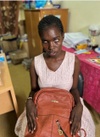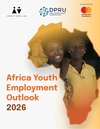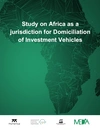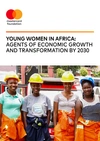WAEMU
Addressing the challenge of employment is a driver for the socio-economic development of the WAEMU region. Our strategy aims to address this challenge by driving transformation in the agriculture value chain through an innovative approach.

-
Goal
To enable 6.2 million young people in the WAEMU region—70 percent of whom are young women—to access dignified and fulfilling work by 2030. Our roadmap aims to bring about a shift in perceptions, resources, relationships, practices, and policies for the development of sustainable and resilient agrifood systems.
-
Context
Agriculture, as the primary source of employment in the West African Economic and Monetary Union (WAEMU) region, constitutes a powerful development driver, with small-scale farmers at its core. The WAEMU region consists of Benin, Burkina Faso, Côte d'Ivoire, Guinea-Bissau, Mali, Niger, Senegal, and Togo.
-
Approach
The Farm to Fork strategy is based on the knowledge and data that inclusive food systems can only be designed from the bottom up to address the actual needs of populations. Through this approach, we are meeting the market demand for locally produced and processed food products and catalyzing the emergence of agro-industry champions at a national and regional level that will drive the sustainable transformation of agriculture in the sub-region.
-
Priority
Agribusiness and adjacent sectors, agro-processing, market access, and primary production.
Our WAEMU Quarterly Newsletter

Read the Mastercard Foundation’s Quarterly Newsletter for the WAEMU Region
This is our October to December 2025 newsletter.
Read moreWatch the inspiring stories of two participants from the Batonga program
Discover the two inspiring journeys of Boury Baldé and Aminata Manga of the Batonga program, whose testimonials illustrate the strength, resilience, and leadership of rural women in Senegal.
Learn more about our work in WAEMU
Programs in WAEMU
The Foundation’s WAEMU office is located in Dakar, Senegal, and currently supports almost 20 active partnerships in the region. Focus sectors for Young Africa Works in WAEMU include agrifood systems, entrepreneurship, and the digital economy.
Research from WAEMU
View All-
Africa Youth Employment Outlook 2026
Education and Transitions Burkina Faso, Guinea-Bissau, Djibouti, Mozambique, Egypt, Benin, Ghana, Senegal, Zambia, Uganda, Côte d’Ivoire, Sierra Leone, Eritrea, Gambia, Eswatini , Ethiopia, Democratic Republic of Congo, Tanzania, Nigeria, Zimbabwe, South Sudan, South Africa, Cameroon, Niger, Morocco, Kenya, Malawi, WAEMU, Chad, Mali, Rwanda, Togo, Somalia -
Study on Africa as a Jurisdiction for Domiciliation of Investment Vehicles - Full Report
WAEMU, Kenya, Rwanda, Burkina Faso, Guinea-Bissau, Djibouti, Mozambique, Egypt, Benin, Ghana, Senegal, Zambia, Uganda, Côte d’Ivoire, Sierra Leone, Eritrea, Gambia, Eswatini , Democratic Republic of Congo, Tanzania, Nigeria, Zimbabwe, South Sudan, South Africa, Cameroon, Ethiopia, Niger, Morocco, Malawi, Chad, Syria, Mali, Togo, Somalia -
Young Women in Africa: Agents of Economic Growth and Transformation By 2030
WAEMU, Kenya, Nigeria, Rwanda, Uganda, Ethiopia, Ghana, Senegal -
Sizing Demand for Junior Roles in ESG and Carbon Analysis in Africa
Kenya, Morocco, Rwanda, Uganda, Ethiopia, Ghana, Mozambique, Mali, Democratic Republic of Congo, Malawi, Gambia, Burkina Faso, Eritrea, Egypt, Djibouti, Côte d’Ivoire, Zambia, Syria, Chad, Eswatini , Zimbabwe, Tanzania, South Sudan, Somalia, Sierra Leone, South Africa, Guinea-Bissau, Senegal, Niger, Cameroon, WAEMU, Nigeria, Benin, Togo
Latest from WAEMU
-
New Report Deepens Understanding of Africa’s Youth Labour Market
-
Young West African Farmers Turn Social Media Into Tools for Growth
-
Mastercard Foundation President and CEO, Reeta Roy, Announces Decision to Transition from the Foundation
-
WAEMU EdTech Conference 2024 Gathers 150 EdTech Stakeholders in Dakar to Discuss Scaling Start-ups for Success and Transforming Education
-
World Data Lab and the Mastercard Foundation Announce Launch of the Africa Youth Employment Clock
-
Angélique Kidjo’s Batonga Foundation Expands its Programs to Senegal to Reach More Adolescent Girls and Young Women
-
Rural Women: The Overlooked Architects of Africa’s Future
-
Driving Context-Relevant Innovation in EdTech
-
Underwriting Foundational Infrastructure Through Creative Use Of EdTech Resources
-
The Mastercard Foundation Scholars Program Accelerates Impact With Three New Partnerships In Africa
-
Investing in public administration data systems to support decision-making
-
Evaluating Progress Made in Africa’s EdTech




























